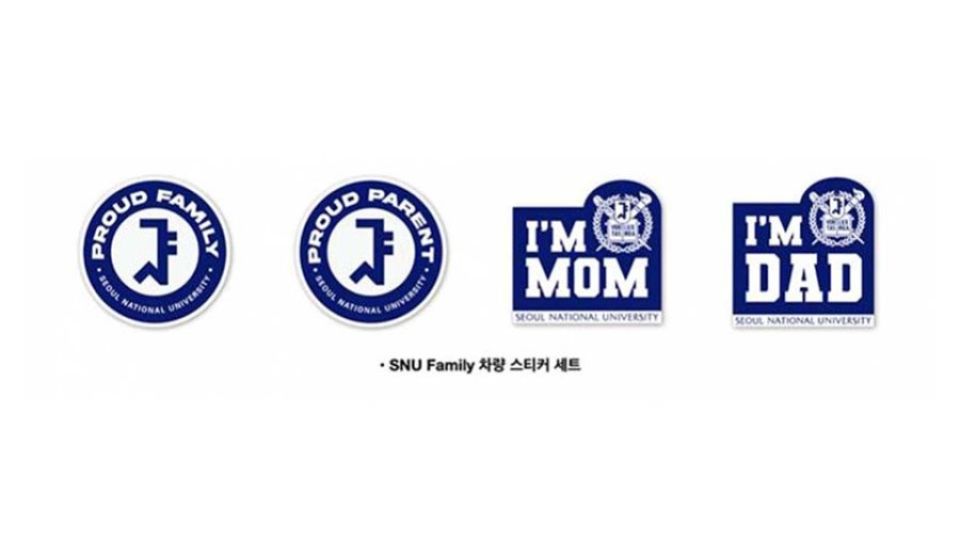August 29, 2024
SEOUL – In South Korea, where getting into a top college is often seen as the golden ticket to success, a simple bumper sticker bearing an elite school’s logo has ignited a fiery debate.
The debate centers around the nation’s undisputed top school, Seoul National University, and its “proud parent” bumper stickers distributed to parents of its students.
An online post criticizing the SNU stickers as elitist quickly went viral, amassing millions of views and sparking heated discussions across social media platforms.
The backlash snowballed Monday when a civic group filed a formal complaint with the National Human Rights Commission. The group argued that the stickers exacerbate college-based discrimination, a longstanding issue in South Korea.
An official from the Seoul National University Foundation, the school’s fundraising arm behind the initiative, told The Korea Herald that the distribution began last December to promote donor relations and improve communication with parents. Free merchandise was handed out to parents who confirmed their credentials, with approximately 2,100 parents receiving the stickers ever since.
“Things quickly spiraled out of control,” the official said.
As of Aug. 20, following an internal review, the university had halted the distribution of the stickers.
“What’s all the fuss?”
Even amid the controversy, the allure of these stickers seems to live on for some parents. “Just today, we had parents calling in to ask if they could get the stickers after seeing it on the news,” the SNU official said.
This enthusiasm echoes deeply ingrained cultural values in South Korea, where a child’s academic achievements are often viewed as a collective effort, with parents making significant sacrifices to support their studies.
A post that went viral on Mlbpark, an online community, expressed bewilderment at the controversy. The post, titled “There are so many sensitive people in the world,” read, “My son studied late into the night and gave up basketball to focus on academics. My wife and I supported him by helping with studies after work and taking extra jobs to pay for hagwon. It’s a hard-earned result, so why can’t we take pride in it?”
The post included a photo of the controversial bumper sticker to authenticate the writer’s credentials. The writer of the post could not be reached for comment.
A survey conducted by The Korea Herald on social media showed that 61 percent of respondents thought it was okay for parents to showcase their children’s academic credentials. Those in favor wondered what all the fuss was about, saying there’s no harm in parents taking pride in their children’s academic accomplishments. User “Robertekim” wrote, “People should mind their own business. Why can’t parents be proud of their accomplishments?”
Some readers noted that such practices are commonplace in other countries, particularly the United States, where prestigious Ivy League institutions have been selling similar merchandise for years. Users from Pakistan and Indonesia shared similar stories from their respective countries.
“Unnecessary pressure and elitism”
On the other hand, 39 percent of survey respondents expressed disapproval with the practice, viewing the stickers as elitist and potentially harmful. User “Elrinconcoreano” commented, “One thing is to be proud of your kid and another thing is to use your kid to show your pride.” Another user, “Labmate_110,” argued, “It creates unnecessary pressure on other students and parents, making them feel like they are not good enough.”
Some respondents argued that South Korea’s uniquely intense academic competition should be taken into account. User “Jueceh” noted, “I don’t think Koreans need more pressure. It’s already difficult for the kids with the suicide rate.” Another user, “Haj49k53m,” cautioned against comparing attitudes toward colleges across cultures, pointing to Koreans’ tendency to discriminate based on alma mater.
According to Lee Byoung-hoon, a professor emeritus of sociology at Chung-Ang University, the controversy over SNU’s bumper stickers looms larger than a mere question of parental pride. The debate, he suggests, may reflect deeper concerns about inequality and social mobility in the country.
“These days, education has become a prime mechanism for inheriting privilege across generations,” Lee told The Korea Herald. “Korean society exemplifies this inherited class status through education perhaps more starkly than anywhere else.”
Recent data from the Korea Student Aid Foundation lends weight to Lee’s observation. A 2022 report revealed that 48.2 percent of aid applicants from Korea’s three elite colleges came from families in the top 20 percent in terms of household income.
For SNU alone, this figure rose to 52.6 percent — roughly 1.6 times higher than the average of nine state schools outside greater Seoul, where only 32.6 percent of applicants hailed from the same high-income tier.
For families struggling to support their children’s elite college aspirations, these stickers might serve as a stark reminder of the growing chasm between social classes. “There was once a time college diplomas served as powerful vehicles for social mobility,” Lee said. “That narrative no longer rings true.”
“These stickers could ignite class resentment and frustration among disadvantaged families who priced out of top-tier education,” he added.


